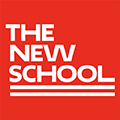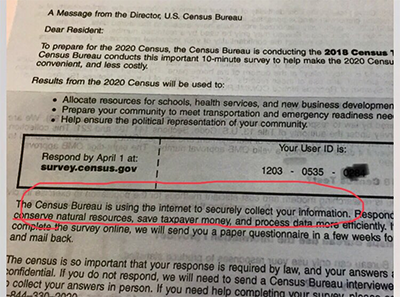The digital equity lab analyzes risks and proposes strategies in preparation for the first digital censusThe report focuses on the digital divide including both access to internet and digital literacy, digital safety and security, and the public accountability of the Census Bureau systems. |
New York--June 6,2019 -- The Digital Equity Lab (DEL) at The New School released a report this week providing recommendations for addressing the risks associated with the transition to a digital decennial census, set to be conducted for the first time in 2020. Given the nation’s persistent digital divide — 35% of adults in the U.S. do not have do not have broadband at home, with even higher rates among Latinx, Black, rural, and elderly populations — transitioning to an online-first digital system without sufficient preparation and support has the potential to overcount affluent White populations (who are more likely to have internet connections at home) and undercount immigrants, people of color, and children (who will likely wait for limited follow-ups via paper surveys or door-to-door enumeration). With $700-900bn in federal funding and the future of electoral districts at stake, an undercount can mean underfunded social programs and a loss of congressional representation for non-White populations. "The overwhelming public focus on the high-stakes citizenship question has taken priority in our national conversation and as a result we are behind in addressing safety and security and functionality concerns surrounding the digital transition," said Digital Equity Laboratory co-director Greta Byrum, "This report is intended to help close the gap in providing safe, accessible, equitable avenues for everyone to be counted." Full Report: Preparing for the Digital Decennial Census: Building Consent, Equity, and Safety into Digital Transition Co-authored by Greta Byrum (Co-Director of the Digital Equity Lab) and Meghan McDermott (Co-Chair of the New York Counts 2020 Tech & Tools Committee), produced in partnership with the New York Counts Tech & Tools Committee, and based on risk assessments and digital safety recommendations compiled by security experts Nasma Ahmed, Sarah Aoun, David Huerta, Sam Lavigne, Dhruv Mehrotra, Rebecca Ricks, and Norman Shamas, the DEL report synthesizes the risks posed by a digital census, particularly those affecting already marginalized populations. The report offers accompanying strategies and recommendations for addressing these risks with specific focus on community-based organizations like public libraries, which play a crucial role in providing internet access and digital literacy supports. While the report’s research focused on the state of New York, most recommendations are more widely applicable across the country. “The 2020 census is an opportunity for libraries to renew our commitment to digital privacy,” said Lauren Moore, Executive Director of the Pioneer Library System and Chair of the New York Library Association’s 2020 Census Task Force. “As we invite the public to complete the census using our devices and networks, we need to scrutinize our practices to make sure the access we provide is safe, secure, and equitable. If people cannot get online or are afraid to participate in the census online, they will not get counted. The DEL report provides libraries with tools to help us address and mitigate community members' concerns about participating in the census online. Implementing these best practices will make libraries better prepared now to support 2020 census efforts and will set libraries up to be the leaders in secure community technology for future e-government initiatives."Concerns regarding the 2020 Census continue to mount, with significant coverage paid to the potential inclusion of a citizenship question. For instance, the New York Times recently reported on a study found posthumously among a Republican strategist’s files that explicitly outlines the partisan advantage of adding a citizenship question to the Census: to intentionally undercount non-White and Hispanic populations in order to create gerrymandered districts more favorable to Republican candidates. While lawsuits over the citizenship question are garnering deserved attention in discussion of the 2020 census, the DEL contends that the digital divide represents a quieter but potentially more insidious threat to fairness and accuracy. Funding for both testing and executing the Census has been cut, resulting in the cancellation of field trials that mean the Census will be rolled out with some new computer systems having never been tested. The Government Accountability Office recently made note of over 500 security vulnerabilities within the Census system. Finally, despite the massive undertaking of a digital transition and legitimate concerns around its integrity, the Decennial Census is currently without a director of technology. The Urban Institute suggests that these concerns compound into a nearly-inevitable undercount that will be the worst since 1990. “We need an all hands on deck approach to make sure that all New Yorkers are counted in the 2020 Census so our City gets the representation and federal funding we deserve,” said New York City Comptroller Scott M. Stringer. “This report is a critical tool in the effort to ensure the success of the first ever digital census.”Therefore, the DEL report focuses on the following areas affecting the Census:
“We are less than one year away from the first ever digital census and are woefully unprepared to ensure safe and robust participation,” said Steven Choi, Executive Director of the New York Immigration Coalition (NYIC), which serves as the convener for New York Counts 2020. “New York Counts 2020 commends the Digital Equity Lab for this vital report and the specific recommendations that every level of government should follow. 18.3% of New Yorkers lack at-home Internet or reliable broadband. These New Yorkers, primarily within low-income communities and communities of color, are at risk of being undercounted in a digital census. The City and State must allocate $40 million each to trusted community-based organizations who can reach into communities on the wrong side of the digital divide and ensure they are counted. If not, New Yorkers will suffer the consequences for the next decade.” The goal of the DEL report is to provide digital tactics that will equip communities and agencies to prepare for the digital census and guard against potential harms while promoting a complete count. For example, the report includes strategies for improving the dynamics of high-traffic public internet access points, best practices for safety and security in census systems (i.e. devices, networks, accounts, and physical space), and suggested operational preparation like developing an incident response plan. Patricia Swann, Senior Program Officer at The New York Community Trust and Chair of the New York State Census Equity Fund, said: “This report addresses one of the most significant challenges to securing a fair and accurate count in 2020 -- the nation's first digital census. We are proud to support the Digital Equity Lab at The New School for its work on this important issue.” |
|
Founded in 1919, The New School was established to advance academic freedom, tolerance, and experimentation. A century later, The New School remains at the forefront of innovation in higher education, inspiring more than 10,000 undergraduate and graduate students to challenge the status quo in design and the social sciences, liberal arts, management, the arts, and media. The university welcomes thousands of adult learners annually for continuing education courses and public programs that encourage open discourse and social engagement. Through our online learning portals, research institutes, and international partnerships, The New School maintains a global presence. |
 |
MARKETING AND COMMUNICATION |
| 79 Fifth Avenue New York, NY 10003 www.newschool.edu |
PRESS RELEASE |
Media Contact: The New School |
|
|
